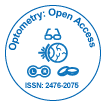మా గ్రూప్ ప్రతి సంవత్సరం USA, యూరప్ & ఆసియా అంతటా 3000+ గ్లోబల్ కాన్ఫరెన్స్ ఈవెంట్లను నిర్వహిస్తుంది మరియు 1000 కంటే ఎక్కువ సైంటిఫిక్ సొసైటీల మద్దతుతో 700+ ఓపెన్ యాక్సెస్ జర్నల్లను ప్రచురిస్తుంది , ఇందులో 50000 మంది ప్రముఖ వ్యక్తులు, ప్రఖ్యాత శాస్త్రవేత్తలు ఎడిటోరియల్ బోర్డ్ సభ్యులుగా ఉన్నారు.
ఎక్కువ మంది పాఠకులు మరియు అనులేఖనాలను పొందే ఓపెన్ యాక్సెస్ జర్నల్స్
700 జర్నల్స్ మరియు 15,000,000 రీడర్లు ప్రతి జర్నల్ 25,000+ రీడర్లను పొందుతున్నారు
ఇండెక్స్ చేయబడింది
- గూగుల్ స్కాలర్
- RefSeek
- హమ్దార్డ్ విశ్వవిద్యాలయం
- EBSCO AZ
- యూరో పబ్
- ICMJE
ఉపయోగకరమైన లింకులు
యాక్సెస్ జర్నల్స్ తెరవండి
ఈ పేజీని భాగస్వామ్యం చేయండి
నైరూప్య
Enhancing Quality Control: A Comprehensive Review of Computer Vision-Based Fabric Defect Detection Methods
Joana Abokoma
Fabric defect detection plays a vital role in ensuring product quality and reducing production costs in the textile industry. With the advent of computer vision techniques, fabric defect detection has witnessed significant advancements, providing automated and accurate inspection capabilities. This research article presents a comprehensive review of the state-of-the-art computer vision techniques employed for fabric defect detection. We discuss various approaches, including image processing, machine learning, and deep learning, highlighting their strengths, limitations, and future directions. The aim of this article is to provide researchers and industry professionals with a comprehensive understanding of the current landscape and inspire further innovation in this field. The proposed study presents a detailed overview of histogram-based approaches, color-based approaches, image segmentationbased approaches, frequency domain operations, texture-based defect detection, sparse feature based operation, image morphology operations, and recent trends of deep learning. The performance evaluation criteria for automatic fabric defect detection is also presented and discussed. The drawbacks and limitations associated with the existing published research are discussed in detail, and possible future research directions are also mentioned. This research study provides comprehensive details about computer vision and digital image processing applications to detect different types of fabric defects.
సబ్జెక్ట్ వారీగా జర్నల్స్
- ఆహారం & పోషకాహారం
- ఇంజనీరింగ్
- ఇన్ఫర్మేటిక్స్
- ఇమ్యునాలజీ & మైక్రోబయాలజీ
- ఎకనామిక్స్ & అకౌంటింగ్
- కంప్యూటర్ సైన్స్
- కెమికల్ ఇంజనీరింగ్
- క్లినికల్ సైన్సెస్
- గణితం
- జనరల్ సైన్స్
- జియాలజీ & ఎర్త్ సైన్స్
- జెనెటిక్స్ & మాలిక్యులర్ బయాలజీ
- నర్సింగ్ & హెల్త్ కేర్
- పర్యావరణ శాస్త్రాలు
- ఫార్మాస్యూటికల్ సైన్సెస్
- బయోకెమిస్ట్రీ
- బయోమెడికల్ సైన్సెస్
- భౌతిక శాస్త్రం
- మెటీరియల్స్ సైన్స్
- మెడికల్ సైన్సెస్
- రసాయన శాస్త్రం
- వెటర్నరీ సైన్సెస్
- వ్యాపార నిర్వహణ
- సామాజిక & రాజకీయ శాస్త్రాలు
క్లినికల్ & మెడికల్ జర్నల్స్
- అంటు వ్యాధులు
- అణు జీవశాస్త్రం
- అనస్థీషియాలజీ
- ఆరోగ్య సంరక్షణ
- ఆర్థోపెడిక్స్
- కార్డియాలజీ
- క్లినికల్ రీసెర్చ్
- గ్యాస్ట్రోఎంటరాలజీ
- జన్యుశాస్త్రం
- టాక్సికాలజీ
- డెంటిస్ట్రీ
- డెర్మటాలజీ
- నర్సింగ్
- నెఫ్రాలజీ
- నేత్ర వైద్యం
- నేత్ర వైద్యం
- న్యూరాలజీ
- పల్మోనాలజీ
- పీడియాట్రిక్స్
- పునరుత్పత్తి ఔషధం
- ఫిజికల్ థెరపీ & పునరావాసం
- మందు
- మధుమేహం & ఎండోక్రినాలజీ
- మనోరోగచికిత్స
- మైక్రోబయాలజీ
- రేడియాలజీ
- రోగనిరోధక శాస్త్రం
- సర్జరీ
- హెమటాలజీ

 English
English  Spanish
Spanish  Chinese
Chinese  Russian
Russian  German
German  French
French  Japanese
Japanese  Portuguese
Portuguese  Hindi
Hindi